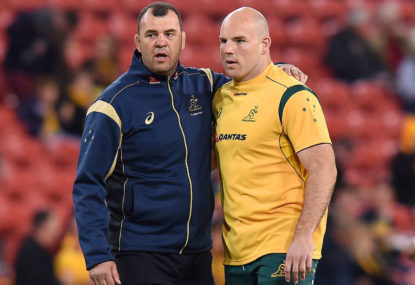We Wallabies fans are getting very close to the top of a tall mountain. There’s no denying that. On Sunday morning we either slip and fall to the bottom, or we climb the summit and set up on the ledge to marvel at the spectacular view.
With the Wallabies playing in a final there is a euphoric element to this week leading up to the match. Our Wallabies are going to run out onto the pitch at Twickenham and play a game to be crowned the best in the world.
So far we’ve swept aside all comers, only one more contender to bat away.
How excite!
But there is a slightly defensive instinct as well. Because what if we lose? It’s a World Cup final, so it’ll hurt that much more. It’s only natural to brace slightly for that kind of impact.
In the end though, you can’t help but get up for it. There isn’t room for pragmatism, a detached perspective or cold-blooded calculation when you’re considering winning a World Cup. Even if you wanted to adopt a defensive posture, you can’t. You have to open yourself up to the possibility you’ll be cheering for a loser.
In reality, cheering for a loser isn’t possible for Wallabies fans, even if it’s true they can lose on the weekend. Making a final is a remarkable achievement for this team when you consider their rocky path to get there.
On October 18, 2014 Wallabies coach Ewen McKenzie sensationally quit after Australia lost to the All Blacks by one point in Brisbane. Everyone watching that night can close their eyes and picture the lonely figure of McKenzie exiting stage right and walking down that long corridor by himself, into the belly of Suncorp Stadium, the scene of so many victories with the Queensland Reds.
The coach was broken. The Wallabies were broken.
One year and a day later, we all rose in the dark and watched Bernard Foley execute the Great Scottish Robbery as the Wallabies progressed through the World Cup quarter-final with a one-point win of their own. A remarkable turnaround.
On October 22 last year Michael Cheika was appointed Wallabies coach. Despite the short time between McKenzie’s resignation and Cheika’s appointment the negotiations about his tenure were tense and point towards the kind of coach he would be.
Cheika wanted an extremely high-class coaching staff, one that wasn’t in place by the time he signed, but one that would eventually come together. It was that kind of foresight that has characterised his short tenure thus far.
He put a brilliant core team around himself. The Wallabies’ defensive efforts against Wales reflect well on Nathan Grey, the attacking precision as the Wallabies jumped to a lead against Argentina were reward for bagging Stephen Larkham, Mario Ledesma has coaxed out the recent scrum improvements, and the team’s composure, commitment and repeat efforts reflect their captain Stephen Moore.
Cheika used the nine precious Test opportunities before the World Cup – just nine games to prepare, that is worth repeating – to expose a wide range of players without creating the feeling of unearned caps. That came full turn when Cheika selected two full teams in his World Cup squad knowing he could rely on the competition to keep training sessions sharp and a strong performance in the week with a short turnaround.
They broke a four-year winless streak against the All Blacks during that short preparation streak as well. That shouldn’t be glossed over because an era of close losses and draws could only come to an end when the Wallabies learnt to win, instead of hoping to not lose.
In a column about the Wallabies’ achievements it’s worth considering the position the All Blacks are in too and what they have to lose.
They have a group players looking to notch up a second World Cup. Richie McCaw, Keiran Read, Sam Whitelock, Kevin Mealamu and the like will join a very special group of players to win two. And for those attempting to win two, doing so in back-to-back tournaments will be a first, and perhaps a record that will last for decades.
Dan Carter missed the majority of the 2011 edition due to injury, so despite being an all-time great he has a lot on the line as well.
Given the evidence at the World Cup and in that victory against the All Blacks, the Wallabies’ chances of winning hinge on David Pocock leading a ferocious breakdown effort, supported by the rest of the pack. It is clear now, Pocock’s return to the Wallabies team and subsequent pairing with Michael Hooper in the backrow is the most influential event in world rugby this year.
A vintage breakdown performance by the men in gold could create enough space to manufacture points and confuse the All Blacks attack, preventing them from nailing the Wallabies for every mistake.
They will have to overcome a tiredness, which I fear will be a factor at the end of both halves. The Wallabies have played a very tough tournament. Coming through that particular run of matches against Fiji, England, Wales, Scotland and Argentina is akin to Lleyton Hewitt playing two weeks of five-set epics before trying to topple Roger Federer in an Open final.
The task isn’t impossible. But it is yet another rock face to traverse in a year of climbing them quickly and without a break.
We will find out on Sunday morning if they have enough in the tank to climb that final rock face and reach the elusive summit, or plummet to a disappointing second place. And we will be with them every step, pick and claw along the way.





























































































